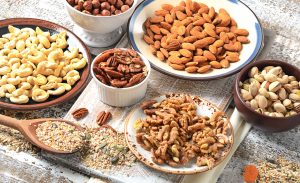
by Melanie Southerland | Jan 10, 2025

Lettuce and kale leaves. UF/IFAS Photo by Tyler Jones
According to the American Heart Association, recommended blood pressure values should be a systolic (upper number) less than 120 mm Hg and a diastolic (lower number) less than 80 mm Hg. High blood pressure, or hypertension, is when blood pressure is consistently higher than normal. Why is this important? Hypertension increases the risk of heart attack and stroke.
Let’s talk about risk factors:
Family History and Age:
If someone in your immediate family has hypertension, you are at a higher risk for the condition. Knowing your family history can help you make lifestyle choices that can be beneficial for your overall health and well-being. As you get older, age increases the risk for the condition. Men are more likely than women to develop the condition before age 64; women have a higher risk after the age of 65.
Unhealthy Eating Pattern:
Eating patterns consisting of foods high in sodium, added sugars, saturated fats, and trans fats can increase the risk of high blood pressure. Unhealthy eating patterns can contribute to overweight and obesity which also is a risk factor for high blood pressure because the extra weight puts strain on the heart and circulatory system. Also, drinking alcohol in excess can cause many health conditions, but it can especially increase the risk of high blood pressure.
Physical Inactivity:
Not getting enough physical activity can increase your risk. Adults should aim for at least 150 minutes of moderate-intensity activity per week. Exercise increases blood flow throughout the body which is beneficial to the heart. Regular physical activity can also help the body maintain a healthy weight.
Other Conditions:
Diabetes, sleep apnea, high cholesterol, smoking, and tobacco use are all other risk factors for getting high blood pressure.

Cooked beets and carrots on a cutting board. UF/IFAS Photo by Tyler Jones
The American Heart Association recommends following a healthy diet pattern. What does a healthy eating pattern look like? Eating a variety of fruits and vegetables, lean protein, low-fat or fat-free dairy, and whole grains. Dark green vegetables such as collards, kale, broccoli as well as sweet potatoes and beets can be beneficial for blood pressure. Fruits such as blueberries, strawberries, kiwi, and bananas are especially good for blood pressure. Choose to eat whole grains rather than refined grains and lean protein foods such as fish and de-skinned chicken. For plant protein sources, choose beans, lentils, and chickpeas. The USDA MyPlate recommends 3 cups of low-fat or fat-free dairy per day. For more information on recommended serving sizes for each food group, visit choosemyplate.gov and check out the 2020-2025 Dietary Guidelines for Americans.
Now that you know about high blood pressure, common risk factors, and how to follow a healthy eating pattern, let’s start reducing our risk for high blood pressure today!
An Equal Opportunity Institution

by Samantha Kennedy | Dec 6, 2024
In the middle of the daily jungle of stressors, there lies a powerful antidote: nature. Research has shown time and again that spending time in green spaces can significantly reduce stress levels and improve overall well-being. And here in Wakulla County, we are blessed with a variety of beautiful places where we can get close to nature.
Here are five ways in which nature works its magic on our minds and bodies:

Spending time with loved ones in nature has been shown to reduce feelings of stress, depression, and anxiety. (Adobe Stock photo)
Step into a forest and be greeted by a symphony of birdsong, rustling leaves, and babbling brooks. These natural sounds have a remarkable ability to soothe frayed nerves and calm anxious minds. Studies have found that exposure to nature sounds can lower levels of cortisol, the stress hormone, and promote relaxation. Additionally, the fragrances emitted by plants and trees, such as pine and lavender, have been shown to have therapeutic effects, reducing stress and anxiety.
The sight of lush greenery and expansive landscapes can have a huge impact on our mental well-being. Whether it is a sprawling meadow, a tranquil lake, or a majestic mountain range, natural scenery provides a visual feast that helps alleviate stress and elevate mood. Even a brief glimpse of nature through a window or a walk in the park during lunch breaks can rejuvenate the mind and enhance cognitive function.
Spending time outdoors exposes us to fresh air and sunlight, both of which are essential for our physical and mental health. Sunlight triggers the production of serotonin, a neurotransmitter that regulates mood and promotes feelings of happiness and relaxation. Additionally, exposure to natural light helps to regulate our circadian rhythms, leading to better sleep quality and overall well-being. Meanwhile, fresh air rich in oxygen boosts brain function and invigorates the body, providing a natural energy boost.
Engaging in physical activities such as hiking, gardening, or even just taking a leisurely stroll in the park allows us to reap the dual benefits of exercise and nature. Exercise is known to be a potent stress reliever, releasing endorphins that act as natural mood lifters. When combined with the calming effects of nature, physical activity becomes even more effective at reducing stress and improving mental health. Furthermore, outdoor exercise encourages mindfulness and promotes a sense of connection with the natural world, fostering feelings of peace and contentment.
Interacting with wildlife, whether it is watching birds soar overhead or spotting deer in the woods, fosters a sense of connection with the natural world. Studies have shown that spending time in nature and observing wildlife can evoke feelings of awe and wonder, which in turn reduces stress and increases feelings of happiness and well-being. Additionally, caring for pets or spending time with animals has been found to have therapeutic effects such as lowering blood pressure and reducing anxiety.
In conclusion, the healing power of nature is undeniable. By immersing ourselves in green spaces and reconnecting with the natural world, we can effectively manage stress, improve mental health, and enhance overall quality of life. So, the next time feelings of stress seem overwhelmed, consider taking a stroll in the park or escaping to the great outdoors.
An Equal Opportunity Institution.

by Kendra Hughson | Dec 6, 2024
We spend a considerable amount of time at work. Often, we spend more time with our co-workers than we do our own families. Fostering a workplace that promotes positive mental health is good for everyone. A positive work environment enhances productivity, job satisfaction, and overall employee well-being. While management and organizational policies play a significant role, contributing to a positive workplace culture is everyone’s job. Here’s how employees at any level can make a difference.
- Practice Open Communication
Open communication builds trust and fosters a culture of transparency. Employees can encourage a positive work environment by sharing ideas, voicing concerns respectfully, and providing constructive feedback. Listening actively to colleagues without interrupting or judging helps build mutual respect and makes everyone feel valued.
Tips to practice open communication:
- Share ideas or concerns in team meetings.
- Approach colleagues directly with questions or concerns instead of relying on assumptions.
- Use tools like Slack or email to keep teams updated, but also recognize the value of face-to-face interactions for more sensitive conversations.
- Show Appreciation and Recognition
Small gestures of appreciation can make a big difference in the workplace. Recognizing a coworker’s hard work or saying “thank you” for assistance fosters a sense of belonging. This builds morale and encourages others to acknowledge each other, creating a supportive environment.
Ways to show appreciation:
- Give a shoutout during meetings for colleagues who went above and beyond.
- Send a quick thank-you email or message to someone who helped you with a task.
- Celebrate team achievements, whether small or big.
- Be Respectful and Engaging
Respect and engagement are fundamental to a positive work environment. This means treating everyone with courtesy, considering others’ perspectives, and avoiding behaviors that could alienate colleagues. A respectful environment allows people to feel safe to express their ideas and be themselves.
How to promote respect and engagement:
- Avoid interrupting colleagues during discussions.
- Respect time boundaries and avoid unnecessary after-hours communication.
- Include others in discussions and decision-making whenever possible.
- Be open-minded and considerate of others’ ideas and backgrounds.
- Take Responsibility and Practice Accountability
Accountability is key to building trust within teams. By taking responsibility for their actions and learning from mistakes, employees contribute to a culture of honesty and reliability. When everyone holds themselves accountable, it minimizes blame-shifting and encourages collective problem-solving.
Ways to practice accountability:
- Own up to mistakes quickly and discuss how to avoid them in the future.
- Set realistic deadlines and follow through with commitments.
- Ask for help or clarification if you’re unsure about something.
- Collaborate and Encourage Teamwork
Teamwork is essential for creating a positive work environment where people feel connected. Collaboration helps foster a sense of community and shared purpose. It allows employees to leverage each other’s strengths and learn from diverse perspectives.
How to promote teamwork:
- Be willing to help team members who may need support.
- Participate actively in team projects and brainstorming sessions.
- Celebrate shared successes and acknowledge each team member’s contributions.
- Offer guidance to new employees or those adjusting to a role.
- Maintain a Positive Attitude
Just as negativity can spread quickly, a positive attitude is also infectious. When employees focus on solutions instead of dwelling on problems, it improves the morale of the whole team. A positive attitude, especially during challenging times, can inspire others to stay motivated.
Tips for maintaining a positive attitude:

When employees are struggling with their mental health, it can lead to increased absenteeism, decreased morale, and lower job satisfaction. Photo Credit: Kendra Hughson
- Practice gratitude by focusing on what’s going well each day.
- Take breaks to recharge and stay mentally refreshed.
- Offer encouragement and motivational words to colleagues.
- Set Healthy Boundaries
Healthy boundaries prevent burnout and maintain a work-life balance, which ultimately contributes to a happier and more productive workforce. By respecting both their own and others’ boundaries, employees help create a sustainable and positive work environment.
Strategies for setting boundaries:
- Avoid checking work emails or messages outside of work hours whenever possible.
- Politely decline additional tasks if your workload is full.
- Respect colleagues’ boundaries by scheduling meetings within core work hours.
- Participate in Team-Building Activities
Team-building activities help employees get to know each other and build trust outside regular work tasks. Taking part in these activities can boost morale and create bonds, leading to a more cohesive and positive workplace.
Ideas for team-building:
- Participate in organized events like team lunches, outings, or volunteer days.
- Engage in virtual games or icebreakers in remote or hybrid settings.
- Suggest occasional fun activities or breaks, like coffee chats or themed lunches.
- Prioritize Professional Growth
A positive work environment is one where employees feel they can grow and improve. By seeking opportunities to learn and develop, employees contribute to a culture of continuous improvement, which can inspire others as well.
Ways to prioritize growth:
- Attend workshops, webinars, or training sessions.
- Seek feedback from peers and managers to improve skills.
- Share knowledge with colleagues to create a collaborative learning culture.
- Be Mindful of Workplace Culture
Every workplace has a unique culture, and understanding it helps employees interact effectively and contribute positively. Being mindful of organizational values, norms, and unwritten rules can help employees align with and positively influence the workplace culture.
Tips for understanding workplace culture:
- Observe how communication happens within the team (formal vs. informal).
- Engage in onboarding or mentorship programs that introduce new hires to the culture.
- Contribute ideas in line with the organization’s goals and mission.
Conclusion
Building a positive work environment is everyone’s job. By focusing on open communication, respect, appreciation, accountability, and a collaborative mindset, employees can foster a culture of positivity and engagement. Small, consistent actions make a big difference in creating a supportive, enjoyable, and productive workplace for everyone.
Source: ChatGPT
During the preparation of this work the author used ChatGPT to compile information about mental health in the workplace. After using this tool/service, the author reviewed and edited the content as needed and takes full responsibility for the content of the publication.

by Samantha Kennedy | Nov 15, 2024
Maintaining a healthy diet can be challenging, especially for individuals managing high blood sugar levels. Choosing the right snacks is crucial for avoiding blood sugar spikes and keeping energy levels stable throughout the day. Here, we explore several healthy snack options that are both delicious and beneficial for those with high blood sugar.

Snacks high in protein, fiber, and healthy fats such as nuts and seeds are a healthy choice for people looking to manage their high blood sugar. (Source: Adobe Stock photo)
Nuts and seeds. These foods are excellent snacks for people with high blood sugar. Almonds, walnuts, flaxseeds, and chia seeds are rich in fiber, healthy fats, and protein, which help stabilize blood sugar levels. A handful of almonds or a tablespoon of chia seeds in a smoothie can keep you feeling full and satisfied without causing a spike in blood sugar. Additionally, these snacks are packed with vitamins and minerals that contribute to overall health.
Fresh vegetables. Foods like carrots, celery, and bell peppers are low in calories and carbohydrates, making them ideal for blood sugar management. These veggies are high in fiber and water content, which help in maintaining a feeling of fullness. Pairing them with hummus or a Greek yogurt dip adds protein and flavor, creating a balanced and tasty snack option.
Berries. Foods such as strawberries, blueberries, and raspberries are not only delicious but also have a low glycemic index, meaning they do not cause significant spikes in blood sugar. Rich in antioxidants, vitamins, and fiber, a small bowl of mixed berries can be a satisfying snack. For added protein, consider combining them with a small portion of Greek yogurt or cottage cheese.
Whole-grain crackers and avocado. This combination provides a perfect balance of complex carbohydrates, healthy fats, and fiber. Whole grains help slow digestion, preventing sudden increases in blood sugar levels, while avocados offer monounsaturated fats that are heart-healthy and satisfying. Sprinkle some chia or sesame seeds on top for an extra nutritional boost.
Greek yogurt. This very versatile snack is high in protein and lower in sugar compared to regular yogurt. It is an excellent option for people with high blood sugar, as protein can help slow the absorption of carbohydrates, thereby preventing spikes. For a more filling snack, add a handful of nuts or fresh berries to a cup of Greek yogurt.
Hard-boiled eggs. This is a simple and convenient snack option packed with high-quality protein and healthy fats. They can help stabilize blood sugar levels and keep hunger at bay. Sprinkle a little salt and pepper or enjoy them with a side of fresh veggies for a complete snack.
Edamame. Also known as steamed soybeans, these are an excellent snack choice for those managing high blood sugar. They are high in protein, fiber, and essential vitamins and minerals. A half-cup serving of edamame provides a satisfying and nutritious snack that supports blood sugar control.
For individuals with high blood sugar, mindful snacking is essential to maintaining stable glucose levels and overall health. By choosing nutrient-dense, low-glycemic snacks such as nuts, fresh vegetables, berries, whole grains, Greek yogurt, hard-boiled eggs, and edamame, it is possible to enjoy delicious and satisfying snacks without compromising blood sugar control. Incorporating these healthy options into your daily routine can make a significant difference in managing high blood sugar effectively.
For more information about healthy eating for people with or without high blood sugar, please contact Samantha Kennedy, County Extension Director, at 850.926.3931.
An Equal Opportunity Institution.

by Suzanne Holloway | Nov 15, 2024
Thanksgiving, like other holidays, promises gratitude and togetherness, but it can also bring stress, awkward moments, and even indigestion. As family members gather – from near and far – to share a meal, navigating conflicting personalities, differing opinion, and the drive for perfection can make hosting feel daunting. To help ensure a peaceful (and maybe even enjoyable) holiday, here are a few Thanksgiving dos and don’ts.
DOs
- Set Realistic Expectations. While many dream of a picture-perfect Thanksgiving, real life is rarely like a cheesy holiday movie. Accept that things might not go as planned, and those imperfections are perfectly fine. Instead of pursuing perfection, aim for a day where everyone has moments of enjoyment, even if brief.
- Plan Ahead. Hosting Thanksgiving can be overwhelming—you’re the cook, cleaner, and event planner all in one. Schedule tasks into manageable chunks over the course of a few days, prepping dishes in advance, and delegating responsibilities. Ask your guests to bring sides – this lightens your load and involves them in the holiday prep.
- Choose Your Seat Wisely. Sit near family members you get along with. If you’re arranging seating, separate personalities likely to clash to keep the atmosphere peaceful.
- Take Care of Yourself. Schedule time for yourself before, during, and after Thanksgiving. It can be a short walk, meditating, or a quick and quiet escape to play a video game or watch a movie. If you are unable to leave a stressful situation, calm yourself with five slow, deep breaths.
- Learn to Let Things Go. Family quirks and annoyances are part of the package. Practice patience and remember, it’s just for a short time.
- Remember the Reason for the Season. Reflect on or share what you are thankful for—whether it’s a good meal, health, a roof over your head, or time with loved ones. Focusing on gratitude can be a great tool to shift the mood toward positivity.
DON’Ts
- Dominate the Conversation. Thanksgiving is for catching up with friends and family, not just talking about yourself. Be mindful, and make space for others to share, especially if it’s been a while since you have seen them.
- Try to Fix Problems. Now is not the time for unsolicited advice or life coaching. One conversation over what is supposed to be a happy meal won’t mend a marriage, convince someone to start a family, make someone a better parent, or get them to hit the gym.
- Discuss Sensitive Topics. Subjects like politics, religion, or lifestyle choices are best left off the dinner table. Even well-meaning questions like “When are you getting married?” or “When can I expect grandchildren?” may seem innocent but can make people uncomfortable. Stick to lighter topics that bring people together, such as favorite family traditions, upcoming plans, or funny memories from past Thanksgivings, this helps create a positive, welcoming environment for everyone.
- Drink Excessively. Some people become argumentative or aggressive when drinking, which can escalate tensions. Avoid these individuals if they get rowdy, and prevent them from driving. If this is an issue for you, consider mocktails or non-alcoholic drinks.
Thanksgiving does not have to be a stressful situation. By prioritizing your well-being and keeping gratitude at the forefront of the celebration, you can make Thanksgiving a meaningful, enjoyable day—flaws and all.
Additional Sources

by Suzanne Holloway | Nov 15, 2024
As leaves change color and days grow shorter, seasonal depression can start affecting some individuals. Seasonal Affective Disorder (SAD), a type of depression with seasonal patterns, often begins in young adulthood and becomes more likely with age, especially for those aged 18 to 30. An estimated 5% of adults in the U.S. experience SAD, with higher rates among people assigned female at birth. Risk factors include having another mood disorder, family history of SAD or other mental health conditions, living far from the equator, or residing in cloudy regions, all of which can increase susceptibility. There are two types of SAD: winter depression and summer depression. Winter depression occurs during the late fall to early winter months. Summer depression is less prevalent, with symptoms starting in late spring to early summer.
Seasonal Depression Symptoms
- Sadness
- Anxiety
- Feeling hopelessness
- Difficulty concentrating
- Increased appetite and weight gain
- Fatigue
- Social withdrawal
- Loss of interest in pleasurable activities
- Issues with sleeping (oversleeping)
- Irritability
- Thoughts of suicide or death
Those who experience summer seasonal depression may also experience:
- Insomnia
- Decreased appetite
- Violent outbursts
While the exact cause of seasonal depression remains unclear, several theories link it to reduced sunlight and shorter winter days. Shorter days disrupt the body’s internal clock, or circadian rhythm, which affects mood, sleep, and hormone levels. Neurotransmitters, brain chemicals, including melatonin and serotonin, can become imbalanced. As winter brings longer periods of darkness, melatonin (a sleep-related hormone) increases, which may may contribute to sluggishness and fatigue. Sunlight and vitamin D help stimulate the production of serotonin (a mood-related hormone); therefore, vitamin D deficiency and reduced sun exposure can impact serotonin levels and mood. Additionally, those with SAD may also experience negative thoughts associated to the season, though it’s unclear if these thoughts are a cause or a result of the condition.
If you’re experiencing symptoms of Seasonal Affective Disorder (SAD), consult your healthcare provider for an evaluation. They may refer you to a mental health professional, as SAD can sometimes be part of a broader mental health condition. Additionally, if you or someone you know is struggling with thoughts of suicide or needs immediate help, dial 988 for free, confidential support.
Sources:











